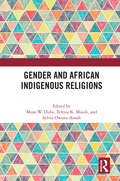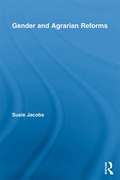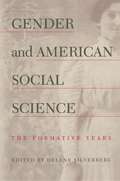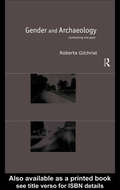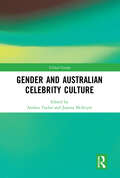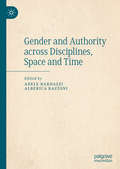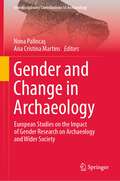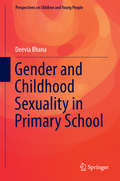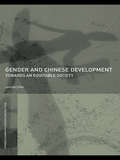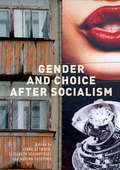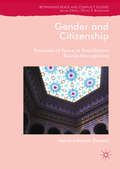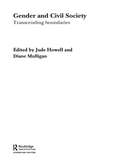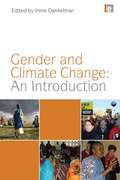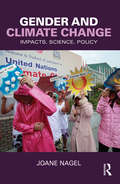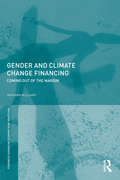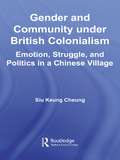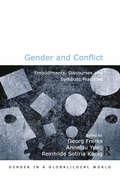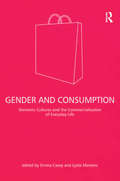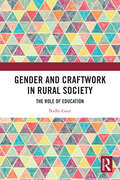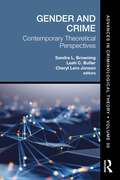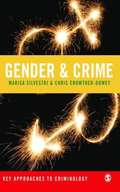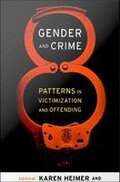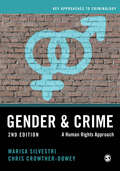- Table View
- List View
Gender and African Indigenous Religions
by Musa W. Dube Telesia K. Musili Sylvia Owusu-AnsahFocusing on the work of contemporary African women researchers, this volume explores feminist perspectives in relation to African Indigenous Religions (AIR). It evaluates what the Circle of Concerned African Women Theologians’ research has achieved and proposed since its launch in 1989, their contribution to the world of knowledge and liberation, and the potential application to nurturing a justice-oriented world. The book considers the methodologies used amongst the Circle to study African Indigenous Religions, the AIR sources of knowledge that are drawn on, and the way in which women are characterized. It reflects on how ideas drawn from African Indigenous Religions might address issues of patriarchy, colonialism, capitalism, racism, tribalism, and sexual and disability-based discrimination. The chapters examine theologies of specific figures. The book will be of interest to scholars of religion, gender studies, Indigenous studies, and African studies.
Gender and Agrarian Reforms (Routledge International Studies of Women and Place)
by Susie JacobsThe redistribution of land has profound implications for women and for gender relations; however, gender issues have been marginalised from both theoretical and policy discussions of agrarian reform. This book presents an overview of gender and agrarian reform experiences globally. Jacobs highlights case studies from Latin America, Asia, Africa and eastern Europe and also compares agrarian and land reforms organised along collective lines as well as along individual household lines. This volume will be of interest to scholars in Geography, Women’s Studies, and Economics.
Gender and American Social Science: The Formative Years
by Helene SilverbergThis collection of essays provides the first systematic and multidisciplinary analysis of the role of gender in the formation and dissemination of the American social sciences in the late nineteenth and early twentieth centuries. Other books have traced the history of academic social science without paying attention to gender, or have described women's social activism while ignoring its relation to the production of new social knowledge. In contrast, this volume draws long overdue attention to the ways in which changing gender relations shaped the development and organization of the new social knowledge. And it challenges the privileged position that academic--and mostly male--social science has been granted in traditional histories by showing how women produced and popularized new forms of social knowledge in such places as settlement houses and the Russell Sage Foundation. The book's varied perspectives, building on recent work in history and feminist theory, break from the traditional view of the social sciences as objective bodies of expert knowledge. Contributors examine new forms of social knowledge, rather, as discourses about gender relations and as methods of cultural critique. The book will create a new framework for understanding the development of both social science and the history of gender relations in the United States. The contributors are: Guy Alchon, Nancy Berlage, Desley Deacon, Mary Dietz, James Farr, Nancy Folbre, Kathryn Kish Sklar, Dorothy Ross, Helene Silverberg, and Kamala Visweswaran.
Gender and Archaeology: Contesting the Past
by Roberta GilchristGender and Archaeology is the first volume to critically review the development of this now key topic internationally, across a range of periods and material culture. ^l Roberta Gilchrist explores the significance of the feminist epistemologies. She shows the unique perspective that gender archaeology can bring to bear on issues such as division of labour and the life course. She examines issues of sexuality, and the embodiment of sexual identity. A substantial case study of gender space and metaphor in the medieval English castle is used to draw together and illustrate these issues.
Gender and Australian Celebrity Culture (Global Gender)
by Anthea Taylor Joanna McIntyreThis intellectually vibrant volume is the first collection to deal with Australian celebrity in ways that account for both cultural and gendered specificities, demonstrating how gendered ways of imagining Australia are reinforced and contested in celebrity representations and self-presentations. Gender and Australian Celebrity Culture engages with celebrities across a diverse range of fields – actors, journalists, athletes, comedians, writers, and television personalities – and in doing so critically reflects upon different forms of Australian fame and the media platforms and practices that sustain them. Authors in this volume engage directly with pertinent issues relating to gender and sexuality, including celebrity feminism and the generative capacity of feminist rage; normative femininity and its instability; hegemonic masculinities; and queerness and its (in)visibility. Contributors also intervene in a number of ongoing debates in media and cultural studies more broadly, including those around the politics and affordances of digital media; whiteness and Australia’s colonial histories; celebrity labour; and methodologies for celebrity studies. This timely collection urges scholars of celebrity to attend further both to the gendered nature of celebrity culture and to local conditions of production and consumption. This book will be of key interest to researchers and graduate students in cultural studies, television and film studies, digital media studies, critical race and whiteness studies, gender and sexuality studies, and literary studies.
Gender and Authority across Disciplines, Space and Time
by Adele Bardazzi Alberica BazzoniThis edited collection investigates the relationship between gender and authority across geographical contexts, periods and fields. Who is recognized as a legitimate voice in debate and decision-making, and how is that legitimization produced? Through a variety of methodological approaches, the chapters address some of the most pressing and controversial themes under scrutiny in current feminist scholarship and activism, such as pornography, political representation, LGBTI struggles, female genital mutilation, the #MeToo movement, abortion, divorce and consent. Organized into three sections, “Politics,” “Law and Religion,” and “Imaginaries,” the contributors highlight formal and informal aspects of authority, its gendered and racialized configurations, and practices of solidarity, resistance and subversion by traditionally disempowered subjects. In dialogue with feminist scholarship on power and agency, the notion of authority as elaborated here offers a distinctive lens to critique political and epistemic foundations of inequality and oppression, and will be of use to scholars and students across gender studies, sociology, politics, linguistics, theology, history, law, film, and literature.
Gender and Change in Archaeology: European Studies on the Impact of Gender Research on Archaeology and Wider Society (Interdisciplinary Contributions to Archaeology)
by Nona Palincaş Ana Cristina MartinsThis volume presents the various ways in which the study of gender makes a difference in archaeological research, the archaeological academic milieu and the wider public’s thinking about gender and considers avenues of future development. It addresses questions such as why gender matters for archaeology, while examining gender from various angles (including aspects such as subjectivity, embodiment, diet, multifaceted perspectives and intersectionality) and in various periods (prehistory, Ancient Egypt, Roman antiquity, the Middle Ages and the modern and contemporary periods). It also discusses the relationship between archaeology and other academic fields involving the study of gender, as well as representations and debates on gender in the media. The theme ‘gender and change in archeology’ emerged out of concerns voiced within the ‘Archaeology and Gender in Europe’ (AGE) working community of the European Association of Archaeologists (EAA) with respect to thefuture of gender archaeology. This book unites researchers of gender archaeology from two perspectives: that of gender archaeologists from academic milieus where the study of gender has long been established and who in the meantime came to feel that this avenue of inquiry had become predictable and lost its provocative power, and that of gender archaeologists from countries where this field was only recently introduced and who, while more enthusiastic about the utility of gender archaeology, are concerned with how to disseminate it among skeptical peers. Both groups of archaeologists mainly argue that, four decades on, the study of gender in archaeology is still able to generate considerable change in our understanding of past and present-day societies. The volume is primarily of interest to archaeologists and researchers of gender studies.
Gender and Childhood Sexuality in Primary School
by Deevia BhanaThis book is an ethnography of teachers and children in grades 1 and 2, and presents arguments about why we should take gender and childhood sexuality seriously in the early years of South African primary schooling. Taking issue with dominant discourses which assumes children's lack of agency, the book questions the epistemological foundations of childhood discourses that produce innocence. It examines the paradox between teachers' dominant narratives of childhood innocence and children's own conceptualisation of gender and sexuality inside the classroom, with peers, in heterosexual games, in the playground and through boyfriend-girlfriend relationships. It examines the nuances and finely situated experiences which draw attention to hegemonic masculinity and femininity where boys and girls challenge and contest relations of power. The book focuses on the early makings of gender and sexual harassment and shows how violent gender relations are manifest even amongst very young boys and girls. Attention is given to the interconnections with race, class, structural inequalities, as well as the actions of boys and girls as navigate gender and sexuality at school. The book argues that the early years of primary schooling are a key site for the production and reproduction of gender and sexuality. Gender reform strategies are vital in this sector of schooling.
Gender and Chinese Development: Towards an Equitable Society (Routledge IAFFE Advances in Feminist Economics)
by Lanyan ChenThis book takes a look beneath the surface of this "miracle growth", to explore the political economy of this process. Beyond the superficial macroeconomics of high growth rates, increasing GDP per capita and high trade volume, the book looks at what is happening to the very socioeconomic and political fabric of society; particularly in terms of the transformation of gender relations. Chen’s study explores: how the gender impacts of government policies shape the unequal realities of women, how women have carried on in production and social reproduction and made efforts to improve their status, and how women could potentially adopt a strategy to overcome the gender impacts so as to attain the equality and justice they have been promised by the Chinese government in a harmonious "well off" society. This book is a core resource for all students of Chinese economics and development studies. The book is also relevant to those who are involved in research and teaching on gender and development and women’s studies.
Gender and Choice after Socialism
by Lynne Attwood Elisabeth Schimpfössl Marina YusupovaThe end of socialism in the Soviet Union and its satellite states ushered in a new era of choice. Yet the idea that people are really free to live as they choose turns out to be problematic. Personal choice is limited by a range of factors such as a person’s economic situation, class, age, government policies and social expectations, especially regarding gender roles. Furthermore, the notion of free choice is a crucial feature of capitalist ideology, and can be manipulated in the interests of the market. This edited collection explores the complexity of choice in Russia and Ukraine. The contributors explore how the new choices available to people after the collapse of the Soviet Union have interacted with and influenced gender identities and gender, and how choice has become one of the driving forces of class-formation in countries which were, in the Soviet era, supposedly classless. The book will of interest to students and scholars across a range of subjects including gender and sexualities studies, history, sociology and political science.
Gender and Citizenship: Promises Of Peace In Post-dayton Bosnia-herzegovina (Rethinking Peace and Conflict Studies)
by Maria-Adriana DeianaThis book examines the remaking of women’s citizenship in the aftermath of conflict and international intervention. It develops a feminist critique of consociationalism as the dominant model of post-conflict governance by tracking the gendered implications of the Dayton Peace Agreement. It illustrates how the legitimisation of ethnonationalist power enabled by the agreement has reduced citizenship to an all-encompassing logic of ethnonational belonging and implicitly reproduced its attendant patriarchal gender order. Foregrounding women’s diverse experiences, the book reveals gendered ramifications produced at the intersection of conflict, ethno-nationalism and international peacebuilding. Deploying a multidimensional feminist approach centred around women’s narratives of belonging, exclusion, and agency, this book offers a critical interrogation of the promises of peace and explores individual/collective efforts to re-imagine citizenship.
Gender and Civil Society: Transcending Boundaries (Routledge Advances in International Relations and Global Politics)
by Jude Howell Diane MulliganOver the last two decades there has been considerable enthusiasm for the concept of civil society amongst researchers, practitioners and activists. Yet despite this enthusiasm for the concept, the gendered nature of civil society and the impact of feminist organizing on civil society has received minimal attention.This edited volume seeks to address this gap, and considers:* how the political environment and nature of the state shapes the way women organize, the issues they address, and their capacity to affect changes in state policies on gender* is the women's movement structurally different from other civil society organizations?* does the gender lens alter our vision of civil society?The chapters in this volume pursue two or more of these questions and cover a diversity of contexts, including the US, East and Central Europe, China, the Middle East, Africa, South East Asia, Central America and Chile. This book not only draws together the concepts of gender and civil society, but also adopts an international perspective, highlighting the diverse trajectories of women organizing in different country contexts and the historical, cultural and political specificities of civil society.
Gender And Class In English Asylums, 1890–1914
by Louise HideAn unprecedented number of people were sent to 'lunatic asylums' in the nineteenth century. But what was life like inside? How was order maintained? And why were so many doctors on the verge of a breakdown themselves? This book provides a glimpse into the lives of patients and staff inside two London asylums at the turn of the twentieth century.
Gender and Climate Change: An Introduction
by Irene DankelmanAlthough climate change affects everybody it is not gender neutral. It has significant social impacts and magnifies existing inequalities such as the disparity between women and men in their vulnerability and ability to cope with this global phenomenon. This new textbook, edited by one of the authors of the seminal Women and the Environment in the Third World: Alliance for the Future (1988) which first exposed the links between environmental degradation and unequal impacts on women, provides a comprehensive introduction to gender aspects of climate change. Over 35 authors have contributed to the book. It starts with a short history of the thinking and practice around gender and sustainable development over the past decades. Next it provides a theoretical framework for analyzing climate change manifestations and policies from the perspective of gender and human security. Drawing on new research, the actual and potential effects of climate change on gender equality and women's vulnerabilities are examined, both in rural and urban contexts. This is illustrated with a rich range of case studies from all over the world and valuable lessons are drawn from these real experiences. Too often women are primarily seen as victims of climate change, and their positive roles as agents of change and contributors to livelihood strategies are neglected. The book disputes this characterization and provides many examples of how women around the world organize and build resilience and adapt to climate change and the role they are playing in climate change mitigation. The final section looks at how far gender mainstreaming in climate mitigation and adaptation has advanced, the policy frameworks in place and how we can move from policy to effective action. Accompanied by a wide range of references and key resources, this book provides students and professionals with an essential, comprehensive introduction to the gender aspects of climate change.
Gender and Climate Change: Impacts, Science, Policy
by Joane NagelDoes gender matter in global climate change? This timely and provocative book takes readers on a guided tour of basic climate science, then holds up a gender lens to find out what has been overlooked in popular discussion, research, and policy debates. We see that, around the world, more women than men die in climate-related natural disasters; the history of science and war are intimately interwoven masculine occupations and preoccupations; and conservative men and their interests drive the climate change denial machine. We also see that climate policymakers who embrace big science approaches and solutions to climate change are predominantly male with an ideology of perpetual economic growth, and an agenda that marginalizes the interests of women and developing economies. The book uses vivid case studies to highlight the sometimes surprising differential, gendered impacts of climate changes.
Gender and Climate Change Financing: Coming out of the margin (Routledge IAFFE Advances in Feminist Economics)
by Mariama WilliamsThis book discusses the state of global climate change policy and the financing of climate resilient public infrastructure. It explains the sources of tensions and conflict between developing and developed countries with regard to global climate protection policies, and highlights the biases and asymmetries that may work against gender equality, women’s empowerment and poverty eradication. Gender and Climate Change Financing: Coming Out of the Margin provides an overview of the scientific, economic and political dynamics underlying global climate protection. It explores the controversial issues that have stalled global climate negotiations and offers a clear explanation of the link between adaptation and mitigation strategies and gender issue. It also maps the full range of public, private and market-based climate finance instruments and funds. This book will be a useful tool for those engaged with climate change, poverty eradication, gender equality and women’s empowerment.
Gender and Community Under British Colonialism: Emotion, Struggle and Politics in a Chinese Village (East Asian Studies)
by Siu Keung CheungGender and Community Under British Colonialism is a study of continuity and change in village communities in the New Territories of Hong Kong, China.
Gender and Conflict: Embodiments, Discourses and Symbolic Practices (Gender in a Global/Local World)
by Georg Frerks Annelou YpeijThrough an in-depth analysis of the multifaceted manifestations of gender and conflict, this book shows how cognition and behaviour, agency and victimization, are gendered beyond the popular stereotypes. Conflict not only reconfirms social hierarchies and power relations, but also motivates people to transgress cultural boundaries and redefine their self-images and identities. The contributions are a mix of classical ethnography, performance studies and embodiment studies, showing ’emotions and feelings’ often denied in scientific social research. Strong in their constructivist approach and unorthodox in theory, the articles touch upon the dynamic relation between the discourses, embodiments and symbolic practices that constitute the gendered world of conflict. The localities and research sites vary from institutional settings such as a school, rebel movements, public toilets and the military to more artistic domains of gendered conflicts such as prison theatre classes and the capoeira ring. At the same time, these conflicts and domains appropriate wider discourses and practices of a global nature, demonstrating the globalised and institutionalised nature of the nexus gender-conflict. A first set of chapters deals with ’breaking the gender taboos’ and renegotiating the stereotypical gender roles - masculinities or femininities - during conflict. A second set of chapters focuses more explicitly on the bodily experience of conflict either physically of symbolically, while the last set straddle body and narrative. The inductive quality of the work leads to unexpected insights and does give access to worlds that are new, and often surprising and unconventional.
Gender and Consumption: Domestic Cultures and the Commercialisation of Everyday Life
by Lydia Martens Emma CaseyDrawing upon anthropological, sociological and historical perspectives, this volume provides a unique insight into women’s domestic consumption. The contributors argue that domestic consumption represents an important lens through which to examine the everyday production and reproduction of socio-economic relations. Through a variety of case studies (such as gambling, wedding day consumption and bedroom décor), the essays explore and reconsider the nature of public and private spaces, and the subsequent nature of domestic space - often by challenging traditional notions of what constitutes ’the domestic’. The volume demonstrates the broad range of experiences that domestic consumption offers women and reveals some of the complex meanings and motivations underpinning women’s consumption practices.
Gender and Craftwork in Rural Society: The Role of Education
by Nidhi GaurThis book examines the potential of craft-centred education to influence the gender socialisation of rural children through a philosophical, sociological, and psychological lens. It discusses Gandhi’s vision of craft-centred education and situates its place within his concept of ‘swaraj.’ The volume looks at the construction of gender at home, students’ participation in crafts at school, and parental perception of craft-centred education. It studies the students’ experience, its impact on their intellectual and physical development, and the nature of the interaction between the socialisation of children at home and in school.An important contribution to the study of Gandhian practices, the book will be of considerable interest to students and researchers of gender studies, education, non-violence, peace studies, and South Asian studies.
Gender and Crime: Contemporary Theoretical Perspectives (Advances in Criminological Theory)
by Sandra L. Browning Leah C. Butler Cheryl Lero JonsonThis volume takes stock of contemporary perspectives on gender and crime. In 1975, Freda Adler published her pathbreaking book, Sisters in Crime: The Rise of the New Female Criminal. She made the bold claim that changes in American society—including changing attitudes and opportunities—would allow for greater participation of women in criminal enterprises.Beyond her substantive thesis, which turned out to be partially accurate, Adler opened up a vibrant new area within criminology: the study of gender and crime. Now nearly a half‑century later, the field of criminology is replete with women scholars who are making plentiful and important contributions. As a result, this volume explores cutting‑edge issues. Part I starts by laying out a theoretical foundation, focusing on the origins of theories of female criminality, and then providing an overview of more contemporary perspectives. Part II explores the role of race in shaping women’s criminality, drawing on the novel approaches of “Black Criminology” and the study of intersectionality. Part III gives attention to issues that heretofore were male‑centric, illuminating female desistance from crime, the effects of peer groups, and gender differences in attitudes toward criminal justice policies. Finally, Part IV considers the explanation of three important realms of criminality—risky lifestyles, white‑collar crime, and terrorism.This volume will be of interest to a wide range of criminologists and is an ideal choice for use in graduate seminars and upper‑level undergraduate courses.
Gender and Crime
by Dr Chris Crowther-Dowey Marisa SilvestriThis text provides a much-needed, comprehensive critical introduction to debates about the relationship between gender and crime. Bringing together both feminist and masculinist perspectives, the book is a 'one stop shop' for gaining knowledge and understanding of the field of gender and crime as a whole. In addition to offering an overview of key themes and issues, Silvestri and Crowther-Dowey breathe new life into existing and well-rehearsed debates by considering the usefulness of drawing on a human rights discourse for making sense of gender, crime and criminal justice. In re-thinking the experiences of women and men as offenders, victims and criminal justice professionals within a human rights framework, the authors encourage a fresh approach to traditional debates about gender and crime. The book integrates empirical, theoretical and policy-related materials in order to encourage a thorough understanding of the field. Complex ideas and debates are grounded with reference to real life examples. The learning process is supported through the use of chapter overviews, key terms, study questions and suggestions for further reading. Gender and Crime is essential reading for students and academics in criminology, sociology, social policy and gender studies. The Key Approaches to Criminology series celebrates the removal of traditional barriers between disciplines and, specifically, reflects criminology's interdisciplinary nature and focus. It brings together some of the leading scholars working at the intersections of criminology and related subjects. Each book in the series helps readers to make intellectual connections between criminology and other discourses, and to understand the importance of studying crime and criminal justice within the context of broader debates. The series is intended to have appeal across the entire range of undergraduate and postgraduate studies and beyond, comprising books which offer introductions to the fields as well as advancing ideas and knowledge in their subject areas.
Gender and Crime
by Candace Kruttschnitt Karen HeimerWhile rates of violent victimization have declined, women are still much more likely than men to be attacked by an intimate partner. Simultaneously, women’s involvement in the criminal justice system, as arrestees and sentenced offenders, is increasing. Criminologists are struggling to understand these patterns of offending and victimization and how they can be prevented. Composed of original contributions by many of the top scholars in criminology, these essays will help to transform our understanding of women's relation to crime. Composed of original contributions by many of the top scholars in criminology, these essays will help to transform our understanding of women’s relation to crime. Contributors: Jennifer L. Castro, Stephen A. Cernkovich, Sarah Curtis-Fawley, Kathleen Daly, Laura Dugan, Jill A. Dienes, Rosemary Gartner, Carole Gibbs, Peggy C. Giordano, Karen Heimer, Gwen Hunnicutt, Candace Kruttschnitt, Gary LaFree, Janet L. Lauritsen, Ross Macmillan, Bill McCarthy, Jody Miller, Christopher W. Mullins, Callie Marie Rennison, Nancy Rodriguez, Sally S. Simpson, Hilary Smith, Stacy Wittrock, Halime Ünal, and Marjorie S. Zatz.
Gender and Crime: A Human Rights Approach (Key Approaches to Criminology)
by Marisa Silvestri Chris Crowther-DoweyThis book is a comprehensive and critical introduction to the field of gender and crime, re-thinking the key themes and debates within a human rights framework. Integrating empirical, theoretical and policy-related material, this Second Edition has been significantly updated, and now includes; Full consideration of the 2010-2015 Coalition Government and its effect on gender and crime within England and Wales A new chapter relating criminological theory to gender and crime A new chapter discussing the history of gender and crime A new chapter analysing contemporary issues in gender and crime in a globalised world Fully updated learning features including; Chapter Overviews, Key Words, Study Questions, Chapter Summaries, Key Further Readings and a Glossary. Gender and Crime: A Human Rights Approach is essential reading for students studying criminology, sociology, social policy and gender studies.
Gender and Crime: A Human Rights Approach (Key Approaches to Criminology)
by Marisa Silvestri Chris Crowther-DoweyThis book is a comprehensive and critical introduction to the field of gender and crime, re-thinking the key themes and debates within a human rights framework. Integrating empirical, theoretical and policy-related material, this Second Edition has been significantly updated, and now includes; Full consideration of the 2010-2015 Coalition Government and its effect on gender and crime within England and Wales A new chapter relating criminological theory to gender and crime A new chapter discussing the history of gender and crime A new chapter analysing contemporary issues in gender and crime in a globalised world Fully updated learning features including; Chapter Overviews, Key Words, Study Questions, Chapter Summaries, Key Further Readings and a Glossary. Gender and Crime: A Human Rights Approach is essential reading for students studying criminology, sociology, social policy and gender studies.
